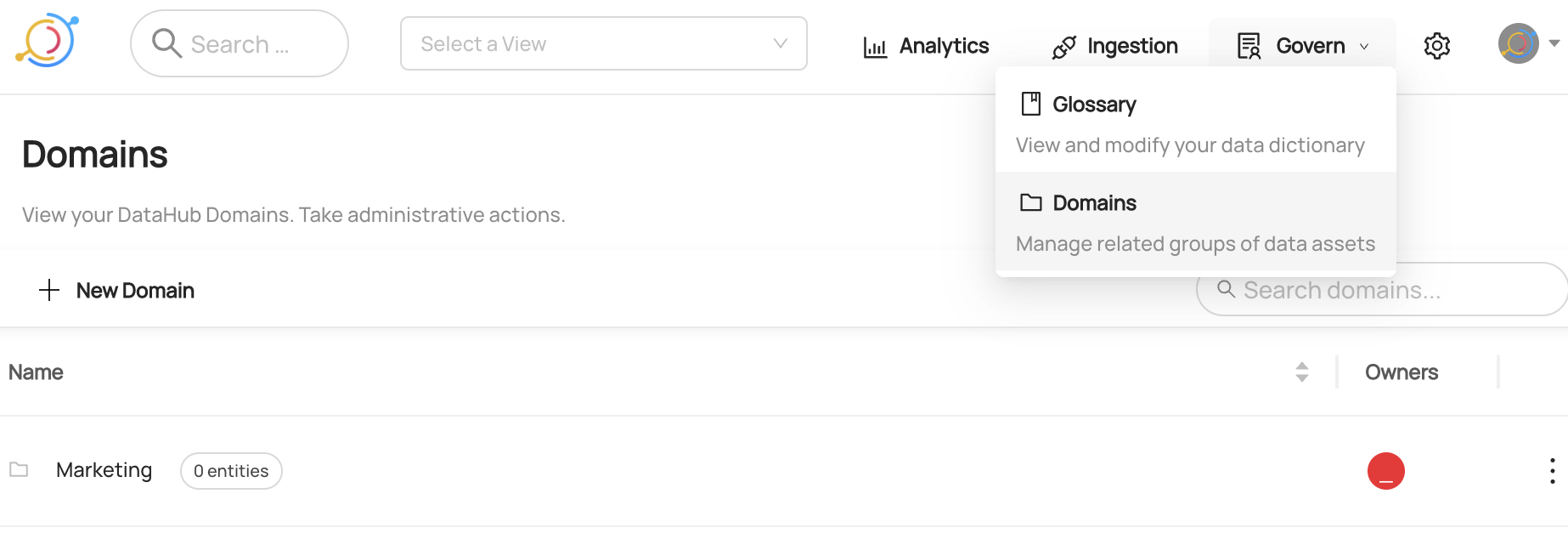Creating Domains
Why Would You Create Domains?
Domains are curated, top-level folders or categories where related assets can be explicitly grouped. Management of Domains can be centralized, or distributed out to Domain owners Currently, an asset can belong to only one Domain at a time. For more information about domains, refer to About DataHub Domains.
Goal Of This Guide
This guide will show you how to create a domain named Marketing.
Prerequisites
For this tutorial, you need to deploy DataHub Quickstart and ingest sample data. For detailed steps, please refer to Prepare Local DataHub Environment.
Create Domain with GrpahQL
::note
Please note that there are two available endpoints (:8000, :9002) to access GraphQL.
For more information about the differences between these endpoints, please refer to DataHub Metadata Service
:::
GraphQL Explorer
GraphQL Explorer is the fastest way to experiment with GraphQL without any dependencies.
Navigate to GraphQL Explorer (http://localhost:9002/api/graphiql) and run the following query.
mutation createDomain {
createDomain(input: { name: "Marketing", description: "Entities related to the marketing department" })
}
If you see the following response, the operation was successful:
{
"data": {
"createDomain": "<domain_urn>"
},
"extensions": {}
}
CURL
With CURL, you need to provide tokens. To generate a token, please refer to Generate Access Token.
With accessToken, you can run the following command.
curl --location --request POST 'http://localhost:8080/api/graphql' \
--header 'Authorization: Bearer <my-access-token>' \
--header 'Content-Type: application/json' \
--data-raw '{ "query": "mutation createDomain { createDomain(input: { name: \"Marketing\", description: \"Entities related to the marketing department.\" }) }", "variables":{}}'
Expected Response:
{"data":{"createDomain":"<domain_urn>"},"extensions":{}}
Create a Domain With Python SDK
The following code creates a domain named Marketing.
# Inlined from /metadata-ingestion/examples/library/create_domain.py
import logging
from datahub.emitter.mce_builder import make_domain_urn
from datahub.emitter.mcp import MetadataChangeProposalWrapper
from datahub.emitter.rest_emitter import DatahubRestEmitter
from datahub.metadata.schema_classes import (
ChangeTypeClass,
DomainPropertiesClass,
)
log = logging.getLogger(__name__)
logging.basicConfig(level=logging.INFO)
domain_urn = make_domain_urn("marketing")
domain_properties_aspect = DomainPropertiesClass(
name="Marketing",
description="Entities related to the marketing department"
)
event: MetadataChangeProposalWrapper = MetadataChangeProposalWrapper(
entityType="domain",
changeType=ChangeTypeClass.UPSERT,
entityUrn=domain_urn,
aspect=domain_properties_aspect,
)
rest_emitter = DatahubRestEmitter(gms_server="http://localhost:8080")
rest_emitter.emit(event)
log.info(f"Created domain {domain_urn}")
We're using the MetdataChangeProposalWrapper to change entities in this example.
For more information about the MetadataChangeProposal, please refer to MetadataChangeProposal & MetadataChangeLog Events
Expected Outcomes
You can now see Marketing domain has been created under Govern > Domains.

What's Next?
Now that you created a domain, how about enriching it? Here is a guide that you can check out.
